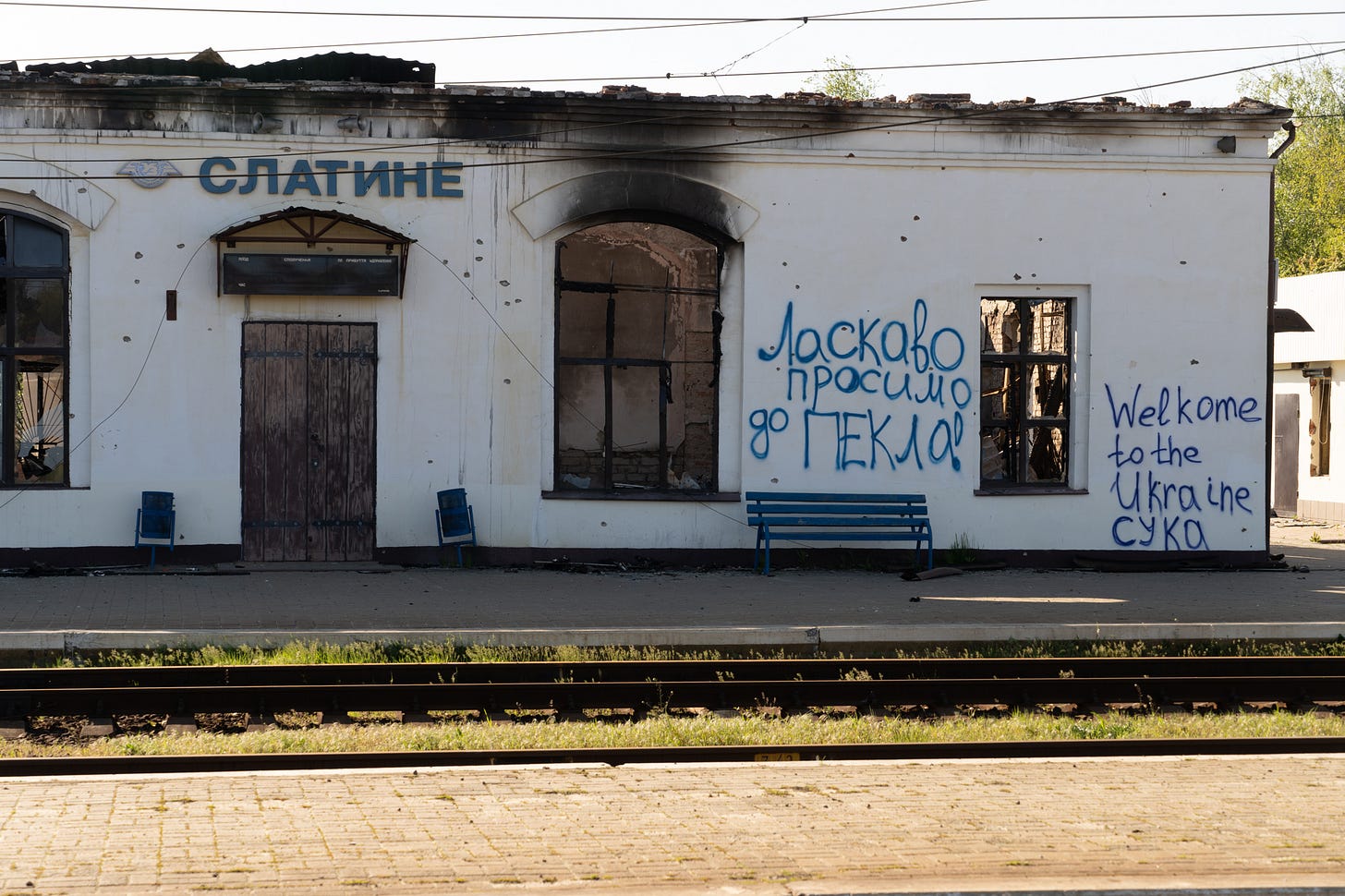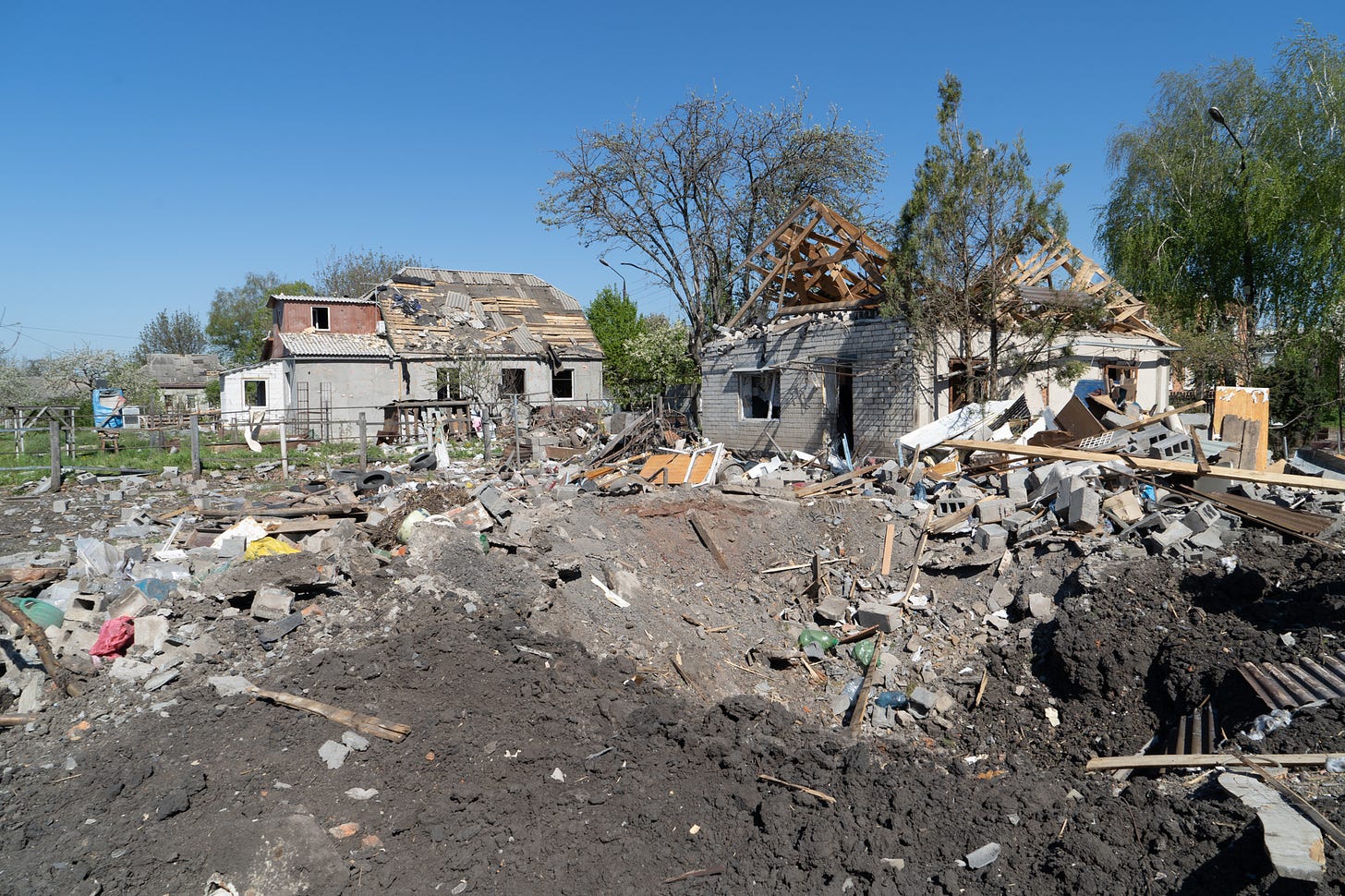
KHARKIV – We sat around a campfire in the gray zone between the Russian and Ukrainian lines, roasting potatoes and drinking Corona beer, as the sun faded over the pastoral countryside of northern Kharkiv Oblast. Our driver’s sister, who was safely in Lviv, had allowed us to spend the night in her country cottage in the town of Slatyne, just 20 kilometers from the Russian border.
It would have been a pleasant place for a rustic weekend getaway. Our view from the backyard was composed of a grassy meadow in front of a small mound, blocking the view of the destroyed buildings behind it. We enjoyed gifts of homemade kompot – a sweet Ukrainian fruit drink that resembles liquified jam – as well as fresh eggs from the chickens next-door. The neighbors may live in hell, remarked our driver, but they were nonetheless hospitable as always.
In my dispatch from Slatyne for the the Sunday Post earlier this week, I described a community left heartbroken by the invasion. While the Ukrainians I know personally were for years warning all who would listen of Moscow’s treachery, Slatyne’s population had been largely pro-Russian prior to February 24. Their reasons were not sinister; many have close family ties across the border, while those who do not nonetheless tend to have Russian roots. Prior to 1991, many simply had not considered the implications of living on the Ukrainian side of what until that point had been a domestic boundary.
The people of Slatyne (also known as Slatino, its Russian name) do, in fact, live in hell nowadays. Artillery could be heard almost every minute during the daylight hours while we were in town. Sometimes it would be a howitzer, which sounds like a normal gun but an order of magnitude louder. Other times, it would be the frenzied launches of Grad rockets blending into a single monstrous rumble. We even heard a helicopter attack at one point, the cannons ripping loose amid the roar of the rotors. The opposing forces spent all day landing explosives on one another, with the Ukrainians behind us firing at the Russians to our front and vice versa. Between the two armies was Slatyne, which thankfully was itself spared incoming fire during our stay.
The town, on paper, was liberated in mid-April from Russian forces. But while Russia had clearly been denied free movement in Slatyne, we saw only a smattering of a Ukrainian military presence on the streets. It was essentially no man’s land; had we kept going north through the town, the next checkpoint would have probably been Russian.
And yet, the street where we spent the night was still populated despite the damage. Our arrival prompted an outpour of locals greeting us, even though we had just barely made it in time for curfew (a loose concept, I suppose, in a town without any law enforcement to speak of). These interviews formed the meat of my aforementioned Sunday Post article:
Another old lady, also named Lyudmila, who did not speak on record, fed us pickled tomatoes as her neighbor Tatiana went on a half-hour monologue. Tatiana, unlike others we spoke with, was extremely patriotic and entirely unsurprised by Russia’s behavior. My suspicion is that the war had proven her right after years of arguments with her neighbors. At one point, she sadly pointed out that Lyudmila’s daughter lives in Belgorod. Just a little more than an hour’s drive away across the border, her child is now across enemy lines. Lyudmila withdrew from the conversation and wept.
To call Ukraine and Russia fraternal nations is to repeat a common Kremlin talking point, thus it is understandably a loathsome notion to most Ukrainians. In Slatyne, this take was interpreted differently. While those we spoke with tended to agree that the two countries shared a familial bond, they were perhaps beginning to understand their brother as a homicidal abuser. Putin’s favored metaphor might begin to make some sense with that caveat.
I have pondered what the people of Slatyne might have thought about the war had their town been slightly to the north, on Russian soil. They had chosen to believe the best about Putin’s Russia for years despite the efforts of the post-2014 Ukrainian state. Only the blood-spattered arrival of Russian forces in their town made them think otherwise. Had they been safely in Russia, treating the war in Ukraine as a mere abstraction to the backdrop of the Kremlin’s stream of misinformation, they would likely be nodding along to the “special military operation,” as the majority of Russians appear to now be doing.
But Slatyne’s residents no longer have the luxury of swallowing Moscow’s talking points. The invasion has transcended all the unfulfilled promises offered by proponents of the russkiy mir.* Rather than supporting Ukraine’s Russian-speaking population, Putin has chosen to destroy their land. Intoxicating as the Kremlin’s rhetoric often is for its intended audience, its credibility has become a proverbial casualty of very real artillery fire in places like Slatyne. It remains to be seen if Putin ever forces a similar reckoning within Russia itself.
*Russkiy mir (русский мир), literally meaning “Russian world,” is the vague nationalist ideology at the heart of Putin’s Kremlin. As the name implies, it is used to justify revanchist ambitions.








